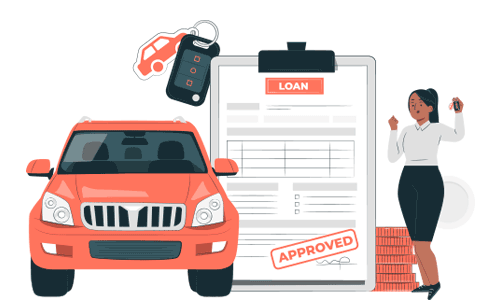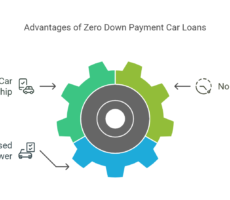When applying for a car loan in the UAE, one of the most critical choices is selecting between fixed vs. variable auto loan rates UAE. This decision directly impacts your monthly payments, loan affordability, and overall financial planning. A fixed auto loan rate offers stability with consistent payments, while a variable auto loan rate fluctuates based on market conditions. In this guide, we’ll analyze fixed vs. variable auto loan rates in the UAE, comparing their pros, cons, and key differences to help you choose the best option.

In this guide, we’ll compare fixed and variable interest rates for UAE auto loans, discussing the pros and cons of each, and helping you decide which option is best for you.
1. What Are Fixed Interest Rates?
A fixed interest rate means that the rate applied to your car loan remains the same throughout the entire loan term. No matter how long the loan lasts, you will always pay the same interest rate on your principal balance.
Key Features of Fixed Interest Rates:
- Consistency: Your monthly repayments are predictable since the interest rate stays the same.
- Stability: You are not affected by fluctuations in the market or central bank policies, which can lead to higher rates.
- Risk-Free: Fixed rates provide a sense of security because you are guaranteed that your payments won’t increase during the loan tenure.
Pros of Fixed Interest Rates:
- Predictable Payments: You’ll always know exactly how much to pay each month, which makes budgeting easier.
- Protection from Market Increases: If interest rates rise in the future, your loan payments won’t be impacted.
- Financial Security: For long-term planning, knowing the exact total amount you will pay over the course of the loan can help with saving and future investments.
Cons of Fixed Interest Rates:
- Higher Initial Rate: Fixed rates are usually higher than variable rates at the outset, meaning your monthly payments may be more expensive.
- Missed Opportunities for Lower Rates: If market interest rates fall, you won’t benefit from lower repayments.
2. What Are Variable Interest Rates?
A variable interest rate (also known as a floating rate) fluctuates based on an external benchmark, typically linked to the central bank’s base rate or a similar indicator. As market conditions change, your rate will adjust periodically, either increasing or decreasing.
Key Features of Variable Interest Rates:
- Market-Linked: Your interest rate is tied to the UAE Central Bank’s benchmark rate, so it can go up or down based on economic conditions.
- Initial Lower Rate: Variable rates often start lower than fixed rates, making them an attractive option for borrowers looking to save on interest in the short term.
- Rate Adjustments: Interest rates can change at regular intervals, such as every six months or annually, depending on your loan agreement.
Pros of Variable Interest Rates:
- Lower Starting Rates: Variable rates often begin lower than fixed rates, so your initial monthly payments may be lower.
- Potential for Decreasing Payments: If the market rates decrease, your interest rate—and therefore your monthly payments—will also reduce.
- Flexible Loan Terms: Some variable loans allow you to make additional payments without penalties, helping you reduce the principal faster.
Cons of Variable Interest Rates:
- Uncertainty: Your monthly repayments can increase if market interest rates rise, making budgeting more challenging.
- Financial Instability: If market conditions worsen, you could end up paying much more than you initially anticipated.
- Complexity: Understanding how rates fluctuate and predicting future trends can be complicated for borrowers who aren’t familiar with market dynamics.
3. How Fixed and Variable Rates Work in the UAE Auto Loan Market
Both types of interest rates are commonly offered by UAE banks and financial institutions. Here’s how they typically work in the UAE market:
- Fixed Interest Rates: UAE banks and auto lenders tend to offer fixed rates for car loans that can range from 5% to 5% depending on the bank, your credit score, and the loan term. These loans provide predictability, which appeals to many borrowers who prefer to know their financial obligations up front.
- Variable Interest Rates: Variable rates in the UAE usually start lower than fixed rates, often ranging from 2% to 4%. However, these rates are subject to change based on the UAE Central Bank’s base rates. If the central bank increases interest rates, your loan payments may increase as well.
4. Fixed vs. Variable Interest Rates: Which Is Better for You?
Choosing between fixed and variable interest rates depends on several factors, including your financial goals, risk tolerance, and current market conditions.
When to Choose a Fixed Interest Rate:
- Stability and Predictability
If you prefer a clear and consistent monthly payment without worrying about market fluctuations, a fixed interest rate is the way to go. It’s ideal for borrowers with a set monthly income or those who don’t want to risk unexpected payment hikes. - Long-Term Loans
If you’re planning on taking out a car loan with a longer tenure (e.g., 4 to 5 years), a fixed rate offers the advantage of knowing your total cost upfront and avoiding potential market volatility. - Low Risk Tolerance
If you’re risk-averse and want to protect yourself from rising interest rates in the future, locking in a fixed rate will ensure your payments stay the same for the life of the loan.
When to Choose a Variable Interest Rate:
- Short-Term Loans or Immediate Needs
If you only need the car loan for a short period (e.g., 1 to 2 years) and are confident that you can pay off the loan quickly, a variable interest rate could be beneficial. With lower initial rates, you can save money upfront before any potential rate increases occur. - Optimizing Low Market Rates
If interest rates are currently low and you expect them to remain stable or decrease, opting for a variable rate could allow you to take advantage of those lower rates, saving money over the term of the loan. - Higher Risk Tolerance
If you’re comfortable with the idea that your monthly payments might fluctuate and can absorb potential rate increases, a variable rate might work to your advantage.
5. Key Considerations for UAE Auto Loan Borrowers
Before making your decision, here are a few additional things to consider:
1. Prepayment and Early Settlement Fees
Some loans, especially those with variable rates, may include prepayment penalties or fees for early settlement. Make sure you understand any potential penalties for paying off your loan early if you anticipate doing so.
2. Interest Rate Changes
If you opt for a variable rate, stay informed about changes in the UAE Central Bank’s base rate. When rates go up, your car loan payments could increase as well.
3. Refinancing Options
If you start with a variable rate but later decide you want stability, most banks in the UAE offer the option to refinance your loan to a fixed rate. However, this might come with additional fees or costs, so it’s worth discussing your options with the lender.
Conclusion: Fixed or Variable?
Choosing between a fixed or variable interest rate for your UAE car loan depends on your financial situation and your preferences for stability versus flexibility. If you value consistency and want to avoid the unpredictability of market fluctuations, a fixed rate is your best option. On the other hand, if you’re looking for lower initial payments and can manage potential rate increases, a variable rate might offer more savings in the short term.
Ultimately, it’s essential to evaluate your personal financial goals, risk tolerance, and the current state of the UAE economy when making this decision. Be sure to compare offers from multiple banks, and if necessary, consult with a financial advisor to ensure you make the best choice for your car financing needs.For Car Loans in Abu Dhabi, Ras al Khaimah and Al Ain Car Financing is possible via Auto Loan vehicle Services Like MyCarLoan.ae

















